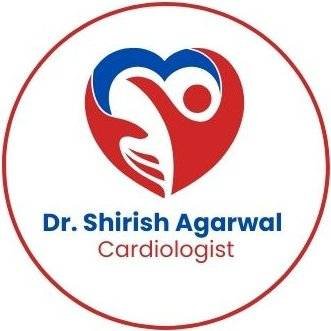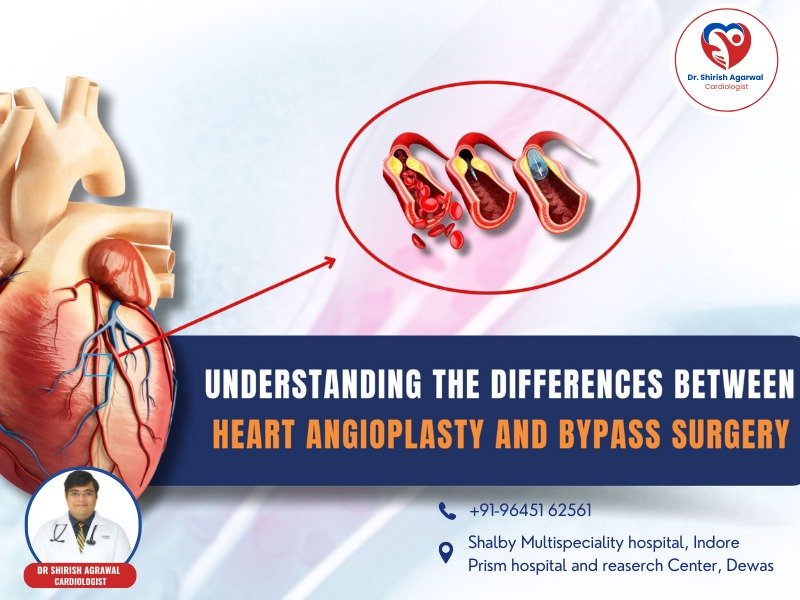Important Features Between Heart Bypass Surgery and Angioplasty
When it comes to treating coronary artery disease, two of the most common procedures are angioplasty and heart bypass surgery. While both aim to improve blood flow to the heart, they are distinct in their approach, recovery, and suitability for different patients. Here, we explore these key differences with insights from Dr. Shirish Agarwal, the best cardiologist in Indore.
What is Angioplasty?
A minimally invasive technique called an angioplasty is done to open coronary arteries that are constricted or obstructed. It involves inserting a thin tube called a catheter into the artery, usually through the groin or arm. The catheter is then guided to the blocked area, where a small balloon at its tip is inflated to widen the artery. In many cases, a stent (a small mesh tube) is placed to keep the artery open.
Advantages of Angioplasty:
- Minimally Invasive: Angioplasties just need a tiny incision, which shortens the healing period and lowers the possibility of problems.
- Shorter Hospital Stay: Most patients can go home within a day or two after the procedure.
- Fast Recovery: Within a week, most patients are back to their regular routines.
Dr. Shirish Agarwal, the best cardiologist in Indore, highlights that angioplasty is especially effective for patients with one or two blocked arteries and those who need a quick resolution of symptoms like chest pain.
What is Heart Bypass Surgery?
Heart Bypass Surgery, or coronary artery bypass grafting (CABG), is a more invasive procedure. It involves creating a new route for blood to flow around a blocked artery. Surgeons take a healthy blood vessel from another part of the body, such as the leg or chest, and graft it onto the coronary artery to bypass the blockage.
Advantages of Heart Bypass Surgery:
- Comprehensive Treatment: CABG can treat multiple blocked arteries in one procedure.
- Long-term Benefits: It often provides longer-lasting relief from symptoms compared to angioplasty.
- Suitable for Complex Cases: It’s ideal for patients with severe or widespread coronary artery disease.
Dr. Shirish Agarwal, known for his expertise in complex cardiac procedures, notes that bypass surgery is often recommended for patients with multiple blockages or those who haven’t had success with angioplasty.
Key Differences
Invasiveness and Recovery
Angioplasty: Minimally invasive with a quick recovery period. Within a week, most patients are back to their regular routines
Bypass Surgery: Highly invasive with a longer recovery period. Patients might need several weeks to months to fully recover.
Suitability for Patients
Angioplasty: Best suited for patients with one or two blocked arteries. It’s also preferred for those who need immediate symptom relief or are not good candidates for surgery.
Bypass Surgery: Ideal for patients with severe coronary artery disease, multiple blockages, or when angioplasty is not feasible or has failed.
Duration and Hospital Stay
Angioplasty: The procedure typically takes about 1 to 2 hours, with a hospital stay of one or two days.
Bypass Surgery: The surgery can take 3 to 6 hours, with a hospital stay ranging from 5 to 7 days, followed by a longer period of rehabilitation.
Long-term Outcomes
Angioplasty: While effective, there’s a possibility of restenosis (re-narrowing of the artery) over time, necessitating additional procedures.
Bypass Surgery: Provides more durable results with a lower chance of needing repeat procedures, making it a preferred option for long-term relief.
Conclusion
Both angioplasty and heart bypass surgery play crucial roles in managing coronary artery disease, but they cater to different patient needs and conditions. Dr. Shirish Agarwal, the best cardiologist in Indore, emphasizes the importance of personalized treatment plans. “The seriousness of the illness, the patient’s general health, and their unique situation all have a role in selecting the best course of action, he says.
If you or a loved one is facing coronary artery disease, consult with Dr. Shirish Agarwal for expert guidance and the best possible care tailored to your condition. His expertise and commitment to patient well-being make him the top choice for cardiac care in Indore.

